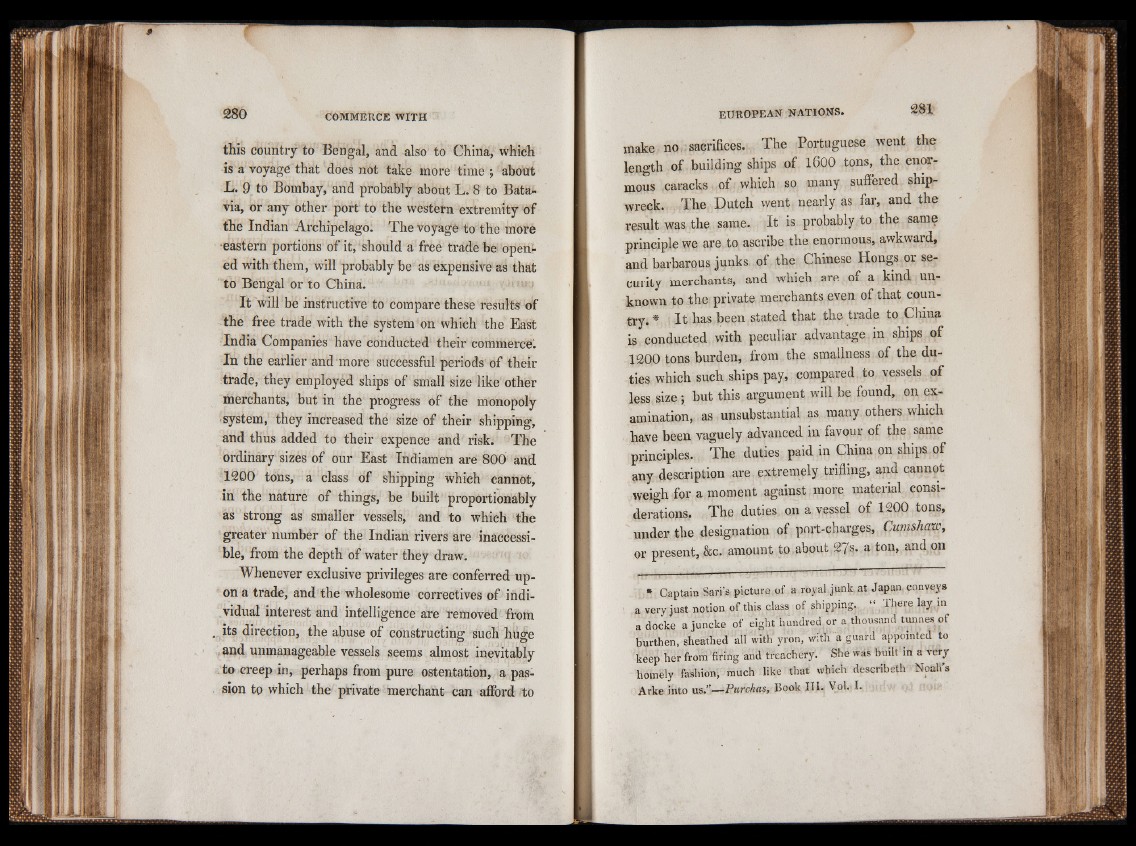
this country to Bengal, and also to China, which
is a voyage that does not take more time ; about
L. 9 to Bombay, and probably about L. 8 to Batavia,
or any other port to the western extremity of
the Indian Archipelago. The voyage to the more
eastern portions of it, should a free trade be opened
with them, will probably be as expensive as that
to Bengal or to China.
It will be instructive to compare these results of
the free trade with the system on which the East
India Companies have conducted their commerce.
In the earlier and more successful periods of their
trade, they employed ships of small size like other
merchants, but in the progress of the monopoly
■system, they increased the size of their shipping,
and thus added to their expence and risk; The
ordinary sizes of our East Indiamen are 800 and
1200 tons, a class of shipping which cannot,
in the nature of things, be built proportionably
as strong as smaller vessels, and to which the
greater number of the Indian rivers are inaccessible,
from the depth of water they draw.
Whenever exclusive privileges are conferred upon
a trade, and the wholesome correctives of individual
interest and intelligence are removed from
its direction, the abuse of constructing such huge
, and unmanageable vessels seems almost inevitably
to creep in, perhaps from pure ostentation, a passion
to which the private merchant can afford lib
make no, sacrifices. The Portuguese went the
length of building ships of l600 tons, the enormous
earacks of which so many suffered shipwreck.
The Dutch went nearly as far, and the
result was the same. It is probably to the same
principle we are to ascribe the enormous, awkward,
and barbarous junks of the Chinese Hongs or security
merchants, and which are of a kind unknown
to the private merchants even of that country.
* It has been stated that the trade to China
is conducted with peculiar advantage in ships of
1200 tons burden, from the smallness of the duties
which such ships pay, compared to vessels of
less size; but this argument will be found, on examination,
as unsubstantial as many others which
have been vaguely advanced in favour of the same
principles,; The duties paid in China on ships of
any description are extremely trifling, and cannot
weigh for a moment against more material considerations.
The duties on a vessel of 1200 tons,
under the designation of port-çharges, Cumshazv,
or present, &c. amount to about 27's. a ton, and on
* Captain Sari’s picture of a royal junk at Japan conveys
a very just notion of this class of .shipping., ,/», There lay m
adocke a juncke of eight hundred, or a thousand tunnes of
burthen, sheathed all with yron, with a guard appointed to
keep her from firing and treachery. She was built m a very
homely fashion, much like that which describe* Noah’s
Arke into us.”—Purchas, Book III. Vol. I.